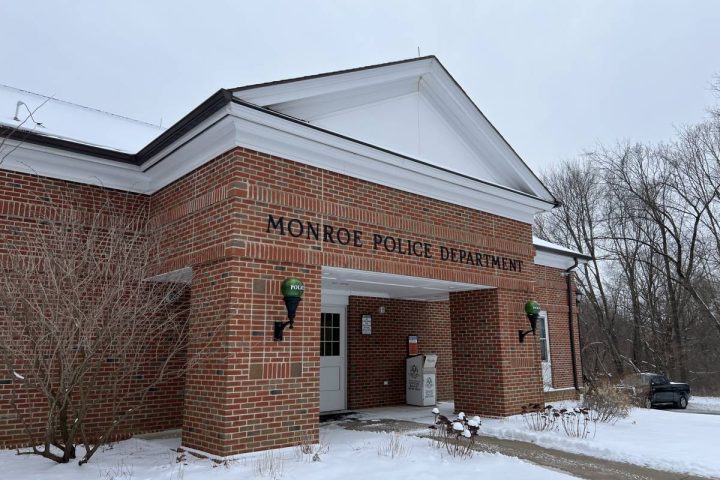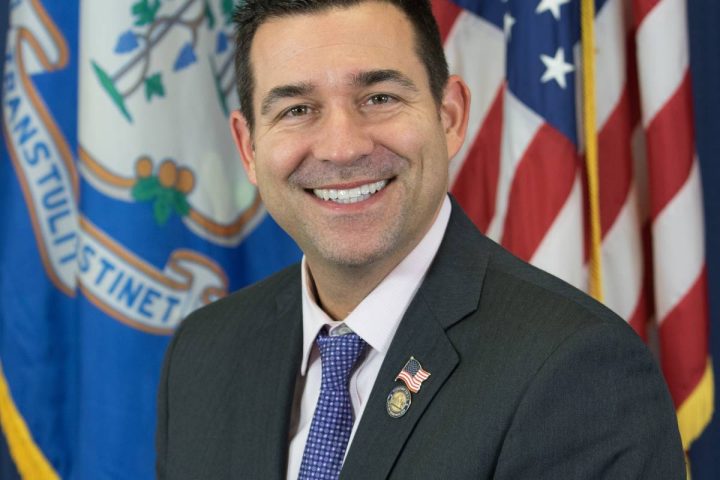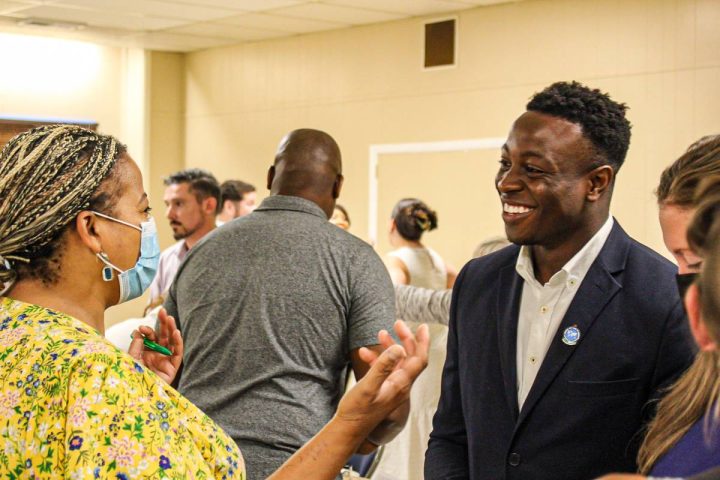MONROE, CT — Incumbent State Rep. Tony Scott, R-112th, and his challenger, Beth Cliff, a Democrat from Easton, are on opposite sides of a ballot measure for No-Excuse Absentee Voting, which will be decided by state voters this November.
State Rep. Matt Blumenthal, D-Stamford, is a strong advocate for the proposal, which is an amendment to Connecticut’s Constitution allowing all residents to vote by absentee ballot, regardless of the reason. He recently spoke about it during a Monroe Democratic Town Committee meeting.
During the COVID-19 pandemic, 79.7 percent out of Connecticut’s eligible voters participated in statewide and presidential elections when the state temporarily allowed everyone to vote by absentee ballot, according to Blumenthal.
“I think that everyone should support it,” he said of the measure to be voted on in November. “I think it will increase voting access, efficiency, ease of administration and security of our elections. Thirty-six states and the District of Columbia have already enacted it and demonstrated its success and we should finally join most states in the country in offering absentee balloting for all who want it in our elections.”
Currently, Connecticut voters can request an absentee ballot only if they cannot make it to the polls on election day for one of the following reasons:
-
Active military service;
-
Absence from town of residence during voting hours;
-
Sickness;
-
Physical disability;
-
Religious beliefs precluding secular activity on election day; or
-
Performance of duties as an election official at a different polling place during voting hours.
The proposed amendment would remove those reasons, allowing registered voters to vote by absentee for any reason. Scott opposes the amendment, while Cliff supports it.
“With the embarrassment in Bridgeport during last year’s Democratic primary for mayor, we clearly see there are issues with absentee ballot voting,” Scott said. “I think we should be spending our time and efforts fixing that ongoing issue instead of offering to expand it.”
“There have been multiple arrests and charges of Democrats going back to 2019 for mishandling absentee ballots,” he continued. “With early voting, the current rules of absentee ballots and election day, I can’t imagine a scenario where someone could not find the time to cast their vote if they so choose. I am against the ballot measure and will be voting no and encourage everyone in Connecticut to look into events of Bridgeport and Stamford to see the illegal misuse of absentee ballots by unscrupulous factions who are breaking our voting laws.”
While conceding issues in the Park City, Cliff still expressed optimism over the ballot measure.
“It’s unfortunate that recent events in Bridgeport seem to have violated the rules and have created questions about the integrity of our elections,” Cliff said. “However, we can’t let a few people who don’t follow the rules make it harder for everyone to have their voice heard in the modern world.”
“I am in favor of this amendment,” she continued. “Like early voting, allowing all citizens to vote by mail only makes voting more accessible. I do think it’s crucial to have safeguards in place to ensure that everyone follows the process.”
Historical background

Blumenthal, who is the House Chair of the Connecticut General Assembly’s Government Administration and Elections Committee, wrote an OpEd published in the Stamford Advocate, in support of the ballot measure.
In portions of his piece, Blumenthal gave a history of absentee voting in Connecticut:
This year’s ballot measure is the culmination of more than 150 years of work. In 1861, young Nutmeggers marched to the Civil War, fighting and dying by the thousands to preserve the Union and end slavery. While they were gone, however, they were deprived of their most fundamental democratic right: they could not vote. In 1862, the legislature passed a law to correct this injustice. But that December, the Connecticut Supreme Court shot it down, holding that absentee voting violated the state Constitution.
The right to vote is one of the most sacred American rights, enshrined in both our federal and state constitutions. “Where there is disenfranchisement,” our state Supreme Court has declared, “a grievous wrong is done to the citizen.”
But that 1862 decision was not the first — or the last — time that our state Constitution’s restrictions on voting would stand in the way of democracy. From the state’s establishment until 1814, only landowners could vote. Connecticut’s 1818 Constitution restricted eligibility to vote to white men until 1870.
And in reaction to the Supreme Court’s 1862 ruling, our state adopted a uniquely tightfisted solution: a temporary constitutional amendment allowing soldiers to vote absentee only for the duration of the Civil War.
Progress has been slow. In 1918, Connecticut — again, only temporarily — passed legislation allowing soldiers serving abroad in World War I to vote absentee. Absentee voting was first allowed for people who could not appear at the polls because of absence from their municipality, sickness, or physical disability in 1932. Those whose religious dictates barred election-day voting were first allowed an absentee ballot in 1964. Today, our absentee-ballot laws are still some of the most restrictive in the country.
In recent years, we’ve made important progress in overcoming that history. In 2022, we passed legislation expanding absentee voting to its constitutional maximum for commuters, healthcare workers, and caretakers. A ballot measure to allow in-person early voting passed by a more-than-20-point margin in 2022.
In 2023, we passed legislation implementing 14 days of Early Voting, as well as the Connecticut John R. Lewis Voting Rights Act, “the nation’s most comprehensive state-level voting rights act.” This past year, we passed legislation to increase election security and transparency and protect election workers from threats, harassment, and violence. I was proud to co-author and help lead passage of all these measures.
“But our most important work is still ahead,” Blumenthal closed. “Our state Constitution still limits absentee-ballot access to six specific reasons. But we can change that this year.”
All respectful comments with the commenter’s first and last name are welcome.







As a former Registrar of Voters, I applaud Beth Cliff’s support of expanding the reasons for voting by absentee ballot. I saw a number of people over the years panicked because they were unable to vote because of last minute business trips or illnesses. Tony Scott’s stand against “no excuse” absentee ballots is wrong and isn’t fair to Monroe’s voters.
To add to my comments from above, I’ll share the following additional thoughts:
What do California, Colorado, Hawaii, Nevada, Oregon, Utah, Vermont and Washington and DC have in common? They all have mail-only balloting – that’s right, it’s ALL done by mail. And 28 other states have no-excuse absentee balloting.
If CT is not ready to go to mail-only, let’s at least make it easier for all of us to have our voice be counted without having to be constrained by excuses that may or may not fit our individual situations. T/y Matt Blumenthal for helping lead the charge on this. And YES, I will be voting for it come November!